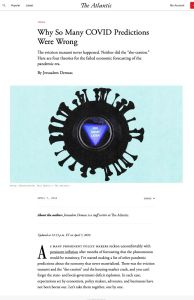
Article
Why So Many COVID Predictions Were Wrong
The eviction tsunami never happened. Neither did the “she-cession.” Here are four theories for the failed economic forecasting of the pandemic era.
The Atlantic,
2022
Recommendation
The onset of COVID-19 in 2020 produced a flood of worst-case economic forecasts: Evictions would mushroom, women would leave the workplace en masse, local government treasuries would empty and the housing market would screech to a halt. But while the worst never happened, being fortunately wrong does not make everything right, according to this intriguing article by journalist Jerusalem Demsas. She outlines how information biases and a mountain of data emerging from a constantly evolving pandemic led to muddied interpretations, glaring inaccuracies, skepticism and bad policies.
Summary
About the Author
Jerusalem Demsas is a staff writer at The Atlantic.
By the same author
Learners who read this summary also read
Article
Book
Book
Article
















Comment on this summary